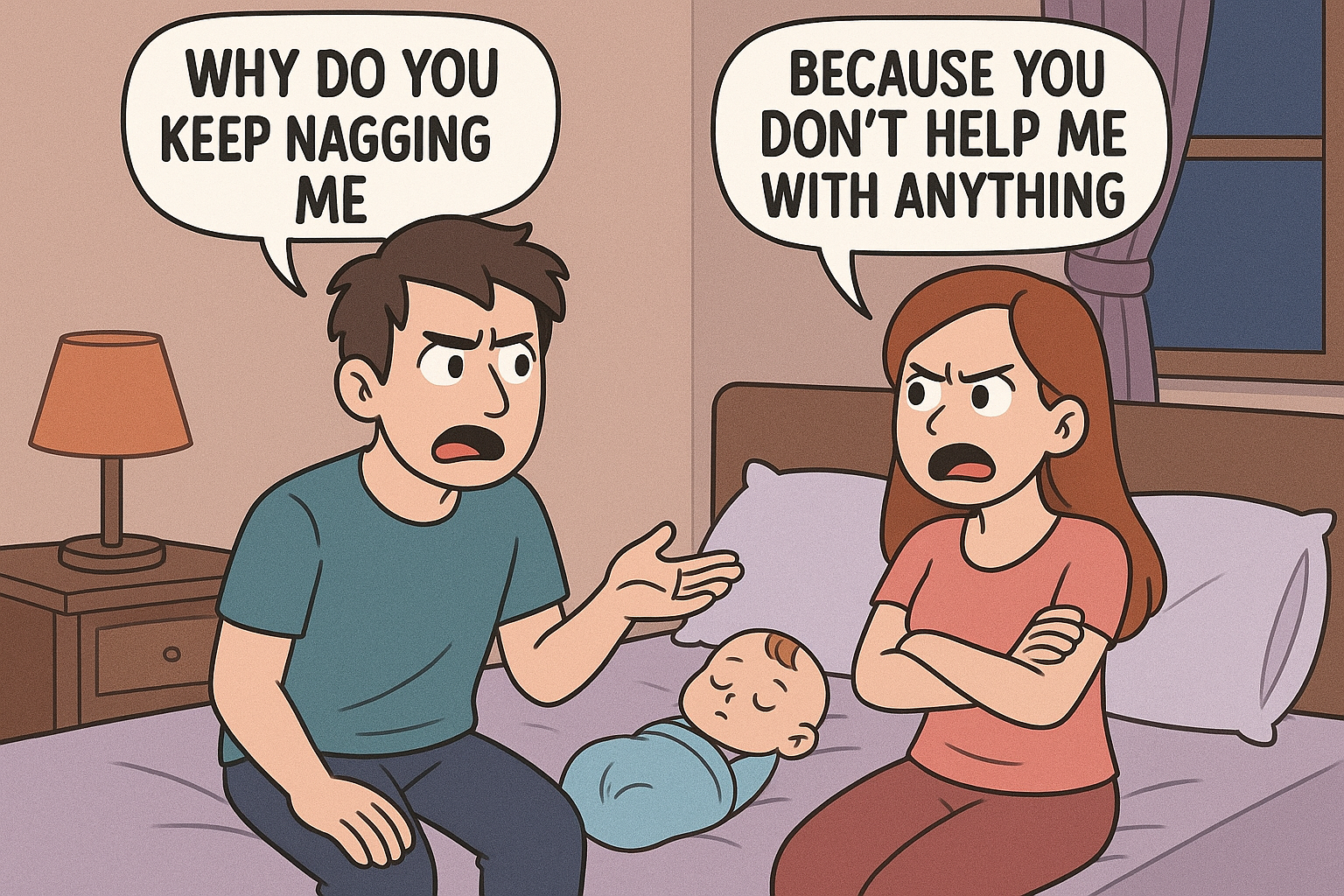But what many couples don’t talk about is the sudden shift
in their relationship once the baby arrives. Love is still there — but so are
sleepless nights, endless responsibilities, unspoken resentments, and
mismatched expectations.
If you’ve found yourself arguing more with your partner
after becoming parents, you’re not alone. Research shows that relationship
satisfaction often dips during the first year after childbirth. The good news?
Understanding why this happens can help you navigate it together instead
of drifting apart.
1. Sleep Deprivation Changes Everything
It’s no secret that newborns don’t sleep through the night.
But few realize just how much interrupted sleep impacts patience, mood, and
communication.
When you’re both running on two hours of rest, even small
things — like who changes the diaper or whose turn it is to burp the baby — can
spiral into arguments. Sleep deprivation can:
- Increase
irritability and emotional reactivity
- Lower
empathy for your partner’s struggles
- Reduce
problem-solving skills
In this fog, it’s easy to misinterpret words or assume your
partner doesn’t care as much. In reality, you’re both simply exhausted and
running on survival mode.
2. Shifting Roles & Responsibilities
Before the baby, household tasks and emotional support may
have felt balanced. After birth, roles shift dramatically — sometimes without
conversation.
One parent may feel they’re carrying most of the “invisible
load” — constant feeding schedules, remembering vaccinations, managing baby
essentials — while the other focuses on earning income or managing household
expenses. If these shifts aren’t openly discussed, resentment brews.
Common role-related conflicts include:
- Feeling
unappreciated for caregiving or financial contributions
- Assuming
one partner has it “easier” without seeing their challenges
- Disagreements
over parenting styles
3. Resentment Can Creep In
Resentment after a baby isn’t always loud — sometimes it’s
silent and slow-burning. You might find yourself thinking:
- “I’m
doing more, and they don’t notice.”
- “They
still get to rest or see friends while my life has completely changed.”
Left unchecked, resentment builds emotional distance. Small
grievances start to feel like proof that your partner doesn’t understand or
value you.
4. Expectations vs. Reality
Many couples enter parenthood with unspoken expectations —
about how involved each partner will be, how quickly intimacy will return, or
how “easy” certain tasks will be.
When reality doesn’t match the mental picture,
disappointment sets in. This isn’t because either of you has failed — it’s
because no one is truly prepared for the complete lifestyle change a baby
brings.
How Therapy Helps New Parents Work as a Team
At The Mind Veda, we often see couples who love each
other deeply but are stuck in cycles of blame after a baby arrives. Therapy
offers:
- A
safe space to voice frustrations without judgment
- Tools
for conflict resolution so you can address issues without turning them
into fights
- Perspective-shifting
techniques to see your partner as an ally, not an opponent
- Communication
strategies that prevent misunderstandings
Therapists help you move from “Who’s at fault?” to “How
do we solve this together?”, replacing resentment with compassion.
Self-Help Tools for New Parents
While therapy can be life-changing, there are steps you can
start using right now to protect your relationship:
1. Schedule Daily Check-ins
Even 10 minutes a day to ask, “How are you really feeling
today?” can prevent emotional distance. No baby talk — just you and your
partner connecting as humans, not only as parents.
2. Divide Responsibilities Clearly
Don’t assume the other person knows what you need. Create a
written or verbal plan:
- Who
handles night feeds on which days?
- Who
manages laundry, cooking, or doctor appointments?
Clear agreements reduce misunderstandings.
3. Use “I” Statements in Arguments
Instead of saying, “You never help with the baby,” try, “I
feel overwhelmed when I handle all the feeds at night.” This shifts the tone
from blame to teamwork.
4. Protect Couple Time
Your relationship needs nurturing too. This doesn’t mean
expensive dates — it can be watching a movie after the baby sleeps, sharing a
cup of tea, or going for a short walk together.
5. Practice Gratitude Daily
Each day, name one thing you appreciate about your partner.
Gratitude can soften tension and remind you you’re on the same team.
Building Compassion Instead of Blame
It’s normal for the stress of a newborn to magnify
differences. But beneath the arguments, most couples want the same thing — to
feel supported, seen, and loved.
When you catch yourself starting to blame, pause and ask:
- “What’s
the bigger picture here?”
- “Are
we both just tired and stressed?”
- “Can
this conversation wait until we’re calmer?”
Sometimes the kindest thing you can do for your relationship
is take a breath before reacting.
The Mind Veda’s Advice for New Parents
Remember: becoming parents is a transition, not just an
event. You’re both learning, adjusting, and growing into these new roles
together.
If the arguments feel frequent, intense, or unresolved,
seeking help early can prevent deeper cracks in your bond. At The Mind Veda,
we work with new parents to:
- Strengthen
emotional connection
- Improve
communication
- Rebuild
intimacy and trust
- Create
parenting strategies that work for both partners
Parenthood doesn’t have to mean losing your relationship —
with the right tools, it can be an opportunity to grow stronger as a couple.
Fighting more after having a baby doesn’t mean your
relationship is doomed. It means you’re human, under pressure, and adapting to
one of life’s biggest changes.
By addressing the root causes — sleep deprivation, shifting
roles, resentment, and unmet expectations — and replacing blame with
compassion, you can navigate this season together.
Your love story doesn’t end when the baby arrives. It simply
enters a new chapter — one where you’re not just partners in love, but partners
in parenting. And with patience, teamwork, and support, it can be the most
rewarding chapter yet.

